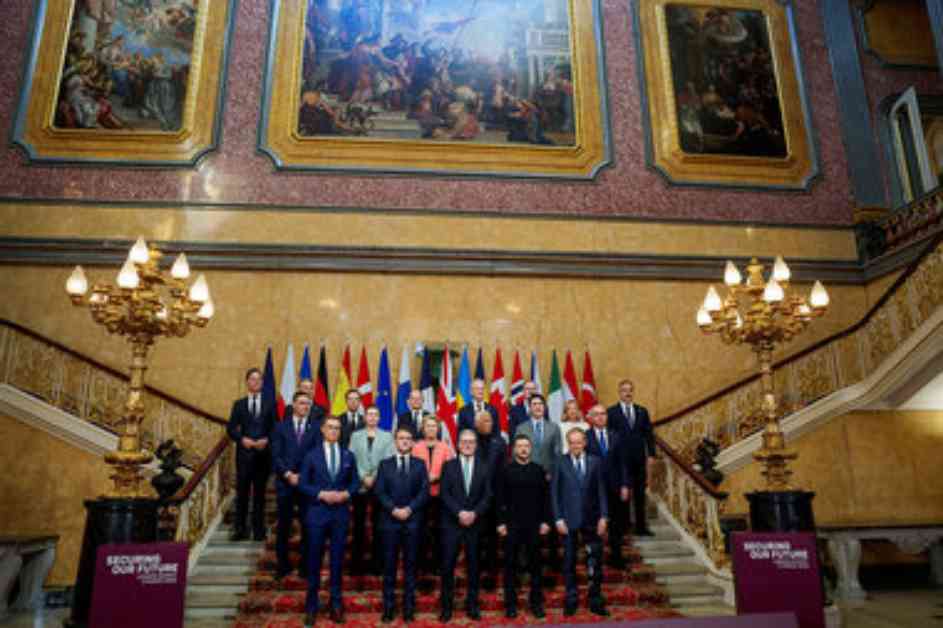The escalating tension between the U.S. and Ukraine following President Donald Trump’s clash with President Volodymyr Zelenskyy has sparked pressing questions regarding European security. Concerns are being raised on multiple fronts, including the need to bolster support for Ukraine, maintain U.S. involvement, and secure peace deals with Russia. Analysts emphasize that Europe must play a more active role in defending itself and its neighbors, a call that has been echoing for years but often overlooked. The situation has reached a critical juncture, with the U.S. scaling back its role in European security, prompting European leaders to convene in London to address the unfolding crisis.
European Unity in the Face of Adversity
British Prime Minister Keir Starmer took the lead in rallying European leaders to devise a plan to support Ukraine and counter Russian aggression. He emphasized the importance of creating a “coalition of the willing” to protect Ukraine and provide essential military aid. One of the primary challenges highlighted is the urgent need to arm Ukraine adequately, as the current supply of weapons from the U.S. is dwindling. European Commission President Ursula von der Leyen underscored the necessity of strengthening Europe’s defense capabilities and transforming Ukraine into a formidable deterrent against potential invaders.
The commitment to bolster defense spending was echoed by NATO Secretary-General Mark Rutte, who emphasized the urgency of enhancing Europe’s military readiness. Despite challenges posed by divergent agendas within the European Union, including Hungarian Prime Minister Viktor Orbán’s alignment with Russia, European leaders are striving to find common ground. Elon Musk’s endorsement of the U.S. withdrawal from NATO adds another layer of complexity, underscoring the need for Europe to navigate internal divisions and external pressures effectively.
Nick Witney, a seasoned expert in European defense policy, highlighted the critical need for Europe to forge an independent defense strategy in the absence of full American participation. The forthcoming summit will focus on streamlining missile production, integrating air defenses, and revising EU regulations to bolster security measures. European leaders are bracing themselves for a paradigm shift in security dynamics, as they navigate the uncharted territory of establishing autonomous defense capabilities.
Seeking Peace Amidst Conflict
Following a contentious meeting between President Trump and President Zelenskyy, concerns have heightened over the potential suspension of U.S. military support to Ukraine. Amid escalating tensions, Defense Secretary Pete Hegseth has taken steps to halt offensive operations against Russia, signaling a delicate balancing act in maintaining stability in the region. President Macron’s efforts to mediate between Trump and Zelenskyy underscore the imperative of restoring diplomatic channels and fostering dialogue to de-escalate the crisis.
President Trump’s social media posts have underscored his commitment to salvaging a mineral deal with Ukraine, aimed at providing economic security guarantees in lieu of direct military intervention. The delicate dance between ensuring peace in Ukraine and preventing further conflict underscores the intricate web of geopolitical interests at play. As the U.S. navigates a complex foreign policy landscape, European leaders are stepping up to fill the void left by shifting U.S. priorities, emphasizing the need for a united front in safeguarding regional security.
Despite the challenges posed by conflicting narratives and divergent interests, European leaders are forging ahead in their quest to secure peace and stability in Ukraine. As they grapple with the fallout of geopolitical tensions and seek to navigate the complexities of international diplomacy, the road ahead remains fraught with uncertainty. The resilience and determination of European nations to defend their sovereignty and protect their allies will be tested in the days to come.

